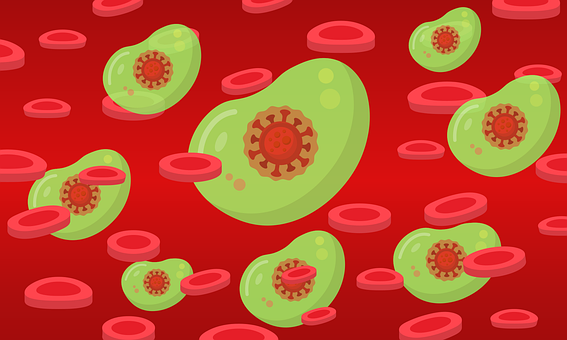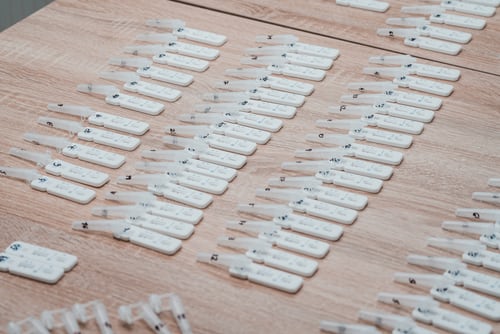Antibodies are crucial elements of the body’s immune system. In our body, plasma cells produce antibodies. They bind to harmful foreign particles like bacteria, viruses, fungi, etc.
Antibodies have a y-shaped structure with two heavy polypeptide chains and two low polypeptide chains. The tip of the ‘Y’ shape forms the paratope. A paratope is a region of the antibody that binds to the foreign element or the antigen to block/destroy it.

Need for industrial antibody production:
The B-cells contain genes coding for antibody polypeptide chains. The different peptide arrangements help the antibodies to detect almost every antigen type. Thus, antibodies can help in the detection of infections.
Diagnostic techniques such as enzyme-linked immunosorbent assays (ELISA) and western blotting techniques utilize antibodies to find antigens and proteins. They are also helpful for analyzing a patient’s immunity profile. They help treat immune deficiencies and illnesses such as rheumatoid arthritis, multiple sclerosis, and even certain cancer types.
Given the essential role of antibodies, scientists have devised ways to produce antibodies on an industrial scale. Today, antibody production service is one of the leading entities of bioengineering organizations. It is possible to produce antibodies with customized affinity and exceptional stability. Below we explain the types of industrial antibodies and their production methods.
Different types of industrial antibodies:
We can broadly classify antibodies based on production methods as polyclonal and monoclonal. Polyclonal antibodies are heterogeneous and can bind to different epitopes of the antigen. B-cells available in the animal body produce these antibodies. Monoclonal antibodies are homogenous and are from clones of similar B-cells.

Production of polyclonal antibodies:
The first step in antibody production is to inject a lab animal such as a rabbit or goat with a desired antigen or immunogen. The antigen activates the plasma B-cells, which in turn produce the antibodies. But B-cells can undergo affinity maturation and produce antibodies with altered binding sites. Thus, re-exposure is often a requirement to get higher affinity antibodies. After the primary immune response, secondary or tertiary inoculation with added adjuvant happens to get higher titers of antibodies. The next step is to collect animal blood serum and purify it to extract the antigen-specific antibodies.
Advantages of polyclonal antibodies:
Polyclonal antibodies require less time for synthesis, and the cost is also low. They have multiple epitopes. They can bind to antigens with alterations due to denaturation, glycosylation, etc. The polyclonal antibodies are tolerant to environmental factors such as pH changes, temperature variation, etc.
The high affinity of polyclonal antibodies makes them suitable for immunoprecipitation. Also, it is easier to tag labeling agents to these antibodies. They can detect the target antigens or proteins even when their concentration is low.
Polyclonal antibodies are applicable for initial diagnostic assays like ELISA and Western blot.
Disadvantages of polyclonal antibodies:
The antibodies produced by the polyclonal method are not similar, and some of their properties can vary from batch to batch. These antibodies have multiple antigen-binding sites. It leads to cross-reactivity. An antibody, thus produced, can attach to chemically similar antigens resulting in false-positive or false-negative results. Often, it is advisable to use polyclonal antibodies for primary detection purposes.
Production of monoclonal antibodies:
The polyclonal method involves live animals for antibody production, whereas monoclonal antibody synthesis happens in tissue culture systems. The first step is to inject the lab animal with the desired antigen. The next step is to extract B-lymphocytes from the animal’s spleen cells after it generates a sufficient immune response.
B-cells produce antibodies but cannot grow in the culture. Subsequently, the fusion of spleen cells and myeloma cells facilitates the synthesis of antibodies in the ex vivo system. The fused cells are hybridoma cells, and it is possible to filter those producing specific antibodies. The antibodies produced are from the clones of the same B-lymphocytes, hence the name monoclonal antibodies.
Advantages of monoclonal antibodies:
Monoclonal antibodies have a single epitope, and thus they offer high specificity. There is no issue of cross-reactivity. Therefore, monoclonal antibodies are suitable for therapeutic applications. These are being used in the treatment of cancer and immunodeficiency problems.
The process involves producing antibodies from clones of hybridoma cells that are homogenous and give consistent results for research experiments. It is possible to manufacture large quantities of antibodies specific to the target antigen. The antibodies obtained are pure, and there is no requirement for further processing. Moreover, the harm caused to the lab animal is less, as it involves extraction of the spleen cells.
Disadvantages of polyclonal antibodies:
It is expensive to produce monoclonal antibodies, and it requires technical expertise. Also, the process is time-consuming as compared to the polyclonal method. The antibodies developed have high specificity and may not bind to slightly altered antigens. The binding capacity gets affected due to external factors like pH, temperature, and labeling.
Final Thoughts:
Both monoclonal and polyclonal are essential for the medical and scientific fields. The choice of antibody depends on the application. For example, polyclonal antibodies are preferable for detecting unknown antigens. They are also helpful in amplifying the signal strength in immunoassays. They can detect proteins in the denatured state. It is possible to produce monoclonal antibodies in large quantities. These have greater specificity and are more suitable for drug development.
Customized antibody production involves high-level purification too. The processes include filtering, centrifugation, and ion-exchange chromatography techniques. The antibody service providers can help you choose the best method based on the end applications.














